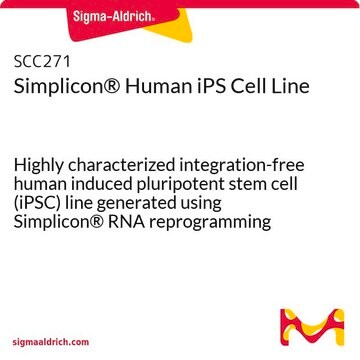66540174
UNEWi021-A
Human iPS Cell Line
Synonym(e):
EBiSC iPSC Line, Human iPSC, Induced Pluripotent Stem Cell Line, iPS Cell, iPSC
About This Item
Empfohlene Produkte
Biologische Quelle
human dermis (fibroblast)
Verfahren zur Umprogrammierung
Sendai virus
Beschreibung
age (80-84)
Hersteller/Markenname
EBiSC™
Geschlecht
female
Wachstumsmodus
adherent (pluripotent)
Methode(n)
cell culture | stem cell: suitable
Relevante Krankheit(en)
none
Versandbedingung
dry ice
Lagertemp.
−196°C
Allgemeine Beschreibung
The EBiSC stem cell bank is a collection of human iPS cells available to academic and commercial researchers for use in disease modelling and other forms of stem cell research. The initial collection has been generated from a wide range of donors representing specific disease backgrounds and healthy controls. EBiSC has established many routine procedures for collecting, expanding and characterizing human iPS cell lines. The stem cell bank includes iPSC cell lines derived from neurodegenerative diseases (Alzheimer′s Disease, Parkinson′s Disease, Dementia, Motor Neuron Disease (ALS) - and Huntington′s Disease), eye and heart diseases, and lines from healthy control donors for age and sex matching.
Ursprung der Zelllinie
University of Newcastle
Beschreibung der Zelllinie
Primary cell type: Fibroblast of dermis
Primary cell developmental stage: Adult
Passage number reprogrammed: P4
Reprogramming method
Vector type: Non-integrating
Vector: Sendai virus
Gene list:
KLF4
MYC
POU5F1
SOX2
Is the reprogramming vector detectable: Unknown
Other:From the same donor: UNEWi021-B, UNEWi021-C
Characterization
Analysis of Undifferentiated Cells
Marker expression: NANOG(+)SSEA-4 (+)SSEA1 (-)TRA 1-60(+)
Differentiation potency
Ectoderm:
Retinal Pigment Epithelium
In vitro spontaneous differentiation
In vitro directed differentiation
Marker Expressed:Tuj1 (+)
Endoderm: In vitro spontaneous differentiation
Marker Expressed:AFP (+)
Mesoderm: In vitro spontaneous differentiation
Marker Expressed:SMA(+)
Microbiology / Virus Screening
HIV 1: -
HIV 2: -
Hepatitis B: -
Hepatitis C: -
Mycoplasma: Negative
Sterility
Inoculation for microbiological growth: No Contaminants Detected
Mycoplasma: Not Detected
Viability: Viable post-cryopreservation
Genotyping
Karyotyping
Passage number: P10
Cell line karyotype: No clinically significant imbalance was detected
Karyotyping method: Molecular karyotyping by SNP array
Genotyping
STR/Fingerprinting: A 16 allele profile has been recorded and data is available upon request, after cell line purchase.
Verlinkung
Subkultur-Routine
Passage method: EDTA
Matrix: Matrigel® / Geltrex®
CO2 concentration: 5%
O2 concentration: 20%
Temperature: 37°C
Rechtliche Hinweise
Lagerklassenschlüssel
10 - Combustible liquids
WGK
WGK 3
Flammpunkt (°F)
Not applicable
Flammpunkt (°C)
Not applicable
Analysenzertifikate (COA)
Suchen Sie nach Analysenzertifikate (COA), indem Sie die Lot-/Chargennummer des Produkts eingeben. Lot- und Chargennummern sind auf dem Produktetikett hinter den Wörtern ‘Lot’ oder ‘Batch’ (Lot oder Charge) zu finden.
Besitzen Sie dieses Produkt bereits?
In der Dokumentenbibliothek finden Sie die Dokumentation zu den Produkten, die Sie kürzlich erworben haben.
Artikel
We offer answers to frequently asked questions and a large collection of cell culture media, supplements, and bioactive small molecules used to control the cell fate of human iPSCs.
Unser Team von Wissenschaftlern verfügt über Erfahrung in allen Forschungsbereichen einschließlich Life Science, Materialwissenschaften, chemischer Synthese, Chromatographie, Analytik und vielen mehr..
Setzen Sie sich mit dem technischen Dienst in Verbindung.








